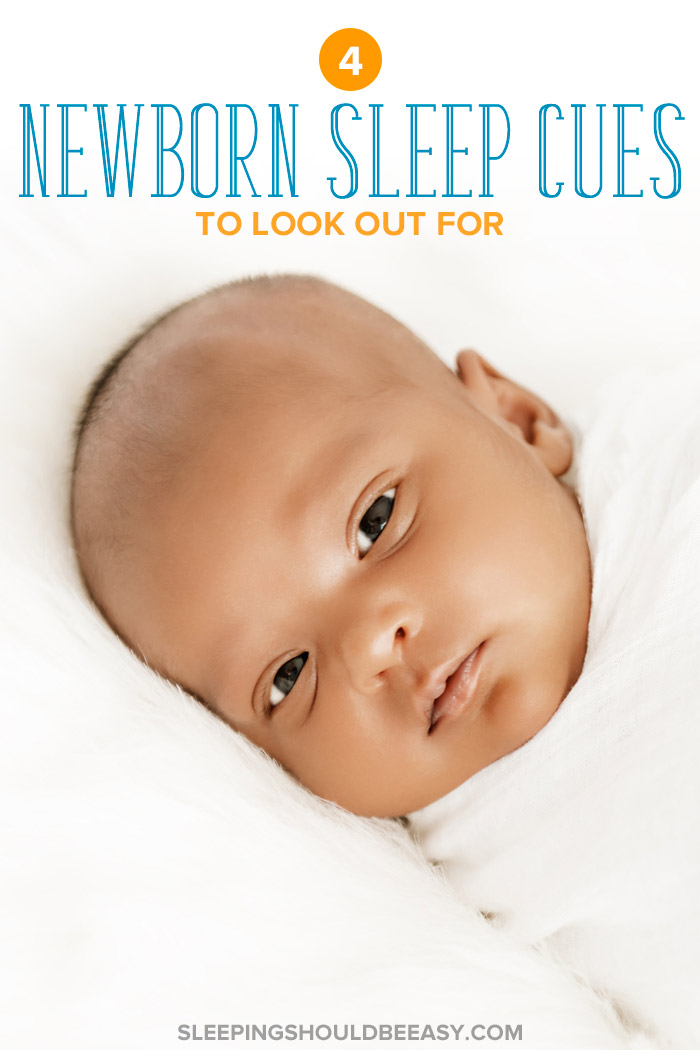4 Newborn Sleep Cues to Look For
Newborn sleep cues are signs that alert parents that baby is ready for sleep. Learn about the 4 newborn sleep cues here.
 I kept hearing conflicting information about newborn sleep cues.
I kept hearing conflicting information about newborn sleep cues.
For instance, I was supposed to watch out for yawns and put the baby down the minute I’d see one. But then I’d hear that if I did see him yawn, that he was already overtired and it’d be too late. Some would say to watch for common baby sleep cues, while others said to watch the clock.
And while I knew babies cried to communicate their needs, I didn’t know whether mine was hungry or sleepy.
It didn’t help that I still felt like I didn’t know what he wanted, or that he sometimes wouldn’t sleep between feeds. I’d try to get him to nap, but then realize I must’ve missed his cues. I felt guilty for not paying enough attention that I wouldn’t even know what he needed.
In the end, all I wanted was to know when to put him down. Feeling so tired myself and not knowing when I could eat or do anything around the house made matters worse.
What are newborn sleep cues?
Let’s back track: what are sleep cues, and how do they help your new baby sleep longer?
Common sleep cues are patterns and behaviors your baby does to signal he’s ready for another sleep cycle. You can catch him at that optimal window when he’s sleepy enough for a good nap, but not overtired that he has a difficult time falling asleep.
By paying attention to these cues, you have a higher chance of putting him down right when he’s ready. And since he started a nap off well, he’s also likely to keep napping, too.
Free resources: Do you struggle with getting him to sleep? The amount of time he’s awake might be affecting how well he sleeps or not. Join my newsletter and get One Mistake You’re Making with Your Baby’s Awake Time—at no cost to you:
Newborn sleep cues to watch out for
The thing is, it’s not always easy, especially for first-time moms, to spot these symptoms. I know I wasn’t the only mom having a hard time figuring out sleep cues.
Deciphering whimpers and cries could be equally challenging when every cry sounds the same for every need. You wonder how to get your overtired newborn to sleep, or how to tell she’s overtired in the first place. And we all know that a baby who doesn’t sleep during the day means she’s more likely to be awake at night.
Rest assured, you can learn to spot sleep cues, and I’ll show you the ones that make the most difference. We’ll also talk about an alternative to sleep cues, which can work just as well.
So, which sleep cues will best help her sleep longer for naps? Here are a few signs of sleepiness to spot:
1. Yawning (up to 3 times)
As confusing as yawning might be (Do I put him down now? Is he already overtired?), it’s still one of the best ways to know your baby could go down for naptime.
The trick is to do so after three yawns—any more than that, and he’s likely overtired.
Now, if you put him down at the first yawn and he falls asleep pretty easily, then by all means, go with the first yawn. But if you find that he doesn’t usually fall asleep until long after, you can still wait. See if he’ll yawn a few more times, or display other sleep cues which we’ll talk about below.
Consider yawning a good time to at least be alert to the potential for sleep cues. You don’t have to put him down right away, but it’s a good idea to be ready to do so. And do your best to put him down by that third yawn.
Get more tips on how to break the cycle of an overtired baby.

2. Telltale eyes
Your baby’s eyes are a good indicator of his sleepiness. Start observing how he looks when he’s alert, so you can see subtle changes when he’s sleepy. A few changes include:
- Glazing over (like he’s “staring off” into space)
- Blinking eyes
- Red, tired eyes
- Rubbing his eyelids, eyebrows, or face
- Unfocused
Once you see him doing any of these behaviors, it’s likely the ideal time to put him down for a nap. Or at the least, keep things quieter so he transitions smoothly into one.
What to do when your tired baby is awake for 6 hours straight.

3. Getting fussy
Is your newborn getting a bit fussy and antsy, instead of calm and content? This could be another cue that she’s ready to sleep once more. This is especially telling if she has few other reasons to fuss about. For instance, she already burped a lot, has a clean diaper, and had been happy moments ago.
But if she’s starting to fuss, especially after she’d been awake a while, she might be ready to sleep. Be on the lookout especially if you feel she might be overstimulated and needs to “recharge” with a nap.
4. Light crying
Loud, intense crying usually means your baby is already overtired—putting him down and expecting him to snooze on his own may be unrealistic. You’re better off holding and calming him down to sleep and giving him extra attention.
But if he’s only crying slightly—really, more like whimpers and “complaints”—then this light crying is a good indicator that he’s ready for sleep. It’s his way of saying he’s tired and needs to shut down for a nap.
Except how do you know whether he’s crying because of hunger cues or sleepy ones? After all, the biggest reason babies cry, according to our pediatrician, is that they’re simply hungry. Your baby likely wants to eat—instead of sleep—if he…
- Grunts
- Roots with his mouth
- Sucks his hands and fists
- Continues to cry even though you’re rocking him
- Smacks his lips
- Is more alert than sleepy
- Spits out the pacifier
Many moms also swear by the Dunstan Method of identifying the sounds of the cries to determine whether a baby is hungry or sleepy.
Go by the clock
Disclosure: This article contains affiliate links, which means I will earn a commission—at no extra cost to you—if you make a purchase.
What do you when, despite staying alert to these cues, you still find yourself unable to spot them? When your baby goes from calm to crazy in a matter of seconds?
Rest assured, there’s nothing wrong with you, your baby, or how you’re raising him. There were many times when I couldn’t for the life of me figure out the sleep cues to put my babies to sleep.
To avoid them getting overtired, I then relied on the clock.
Depending on your baby’s age, you could put him down for a nap based on how long he had been awake. In other words, it’s less about set nap times (e.g. 10am naps) as it is deciding how long he should be awake (for instance, 60 minutes since waking up).
During the sleepy newborn stage, don’t keep him awake longer than 90 minutes max. Over the next few months, you’ll be able to stretch this time to two and even three hours. But for now, err on the side of a shorter wake window between frequent naps.
Expert tip
Rely on the “EASY” routine, popularized in the book Secrets of the Baby Whisperer by Tracy Hogg. This routine is less about times of the day as it is following a rhythm or flow of sleeping, feeding, and play time. It’ll give you and your baby a somewhat predictable schedule to rely on, even in the newborn stage.
Get tips on how to survive the newborn stage.

Conclusion
Newborn sleep cues can be some of the best indicators that your baby is ready to sleep. Catching her at that optimal time will help her fall asleep smoothly and take longer naps.
Yawning is one of the most common baby tired signs—put her down no more than three yawns to avoid her being overtired. Observe her eyes, both when she’s alert and when you notice a change, to see if she’s sleepy. Fussiness, especially when she has little reason to fuss, can mean she’s ready for a nap.
Light crying, almost like “complaints” would be a good time to sleep, especially if it differs from her hunger cries. And finally, don’t beat yourself up if you still can’t spot these cues. Simply go by the clock, putting her down depending on how long she’d been awake.
Conflicting information about sleep cues can be confusing because we don’t have a one-size-fits-all solution. Instead, do your best to spot sleep cues, however subtle those yawns and glazed eyes might be.
Get more tips:
- 12 Things to Do When Your Newborn Fights Sleep
- Clever Solutions to the Newborn Witching Hour
- What to Do When Your 3 Month Old Won’t Nap
- 5 Useful Tips for New Dads in the Newborn Stage
- What to Do When Your Overtired Baby Keeps Waking Up
Don’t forget: Join my newsletter and get One Mistake You’re Making with Your Baby’s Awake Time below:



